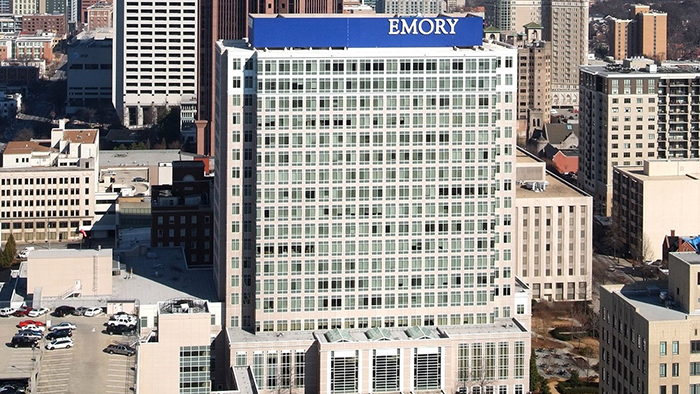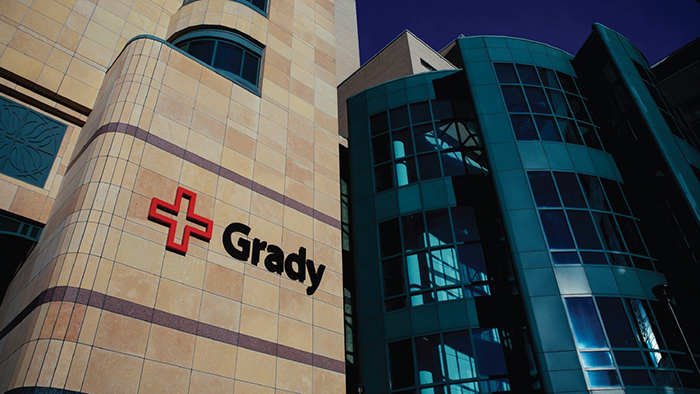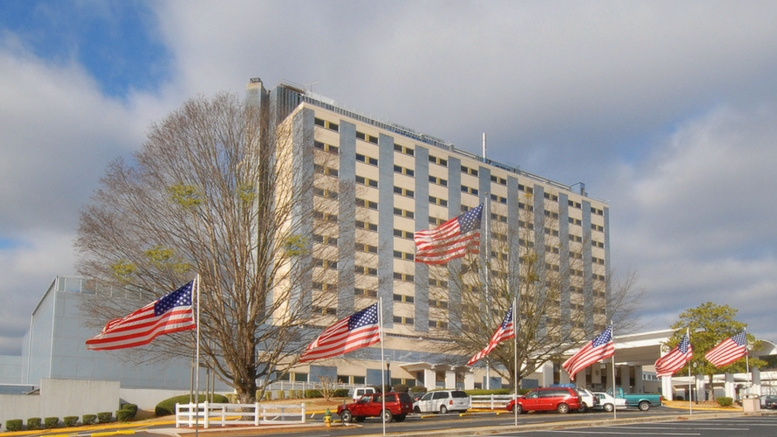Inpatient rotations are performed at the four primary Emory University affiliated teaching hospitals, which include Emory University Hospital (EUH), Emory University Hospital Midtown (EUHM), Grady Memorial Hospital (GMH), and the Atlanta VA Medical Center (VAMC).
Emory University Hospital

General ID Consult Service
Emory University Hospital is a quaternary care hospital with over 750 total beds where fellows see a vast array of patients, including general medical and surgical inpatients, those in a variety of intensive care units (medical, surgical, cardiac, cardiothoracic, and neurological), and patients with a range of immunocompromising conditions (including patients living with HIV and those taking immunosuppressive medications).
Unique aspects of this site for clinical training include exposure to patients with complex surgical, neurosurgical, and cardiovascular procedures, and those receiving immunomodulatory therapies for a variety of benign and malignant conditions. The EUH General ID Consult service is supported by dedicated ID PharmDs who participate actively in rounds with the teaching team. Additionally, there are two general ID consult services at EUH, one of which is staffed by an attending and advanced practice providers (APPs), which helps to balance patient volumes and support the teaching service. Finally, all the inpatient consult teams attend microbiology (“plate”) rounds from Monday to Friday in the clinical microbiology laboratory, where fellows interact directly with laboratory staff, review specimens, and receive focused teaching from faculty in ID and clinical pathology.
Fellows rotate on the General ID Consult service at EUH for 6-10 weeks in Year 1, then may return for 2-week blocks later in the fellowship. The consult team includes the fellow, an attending, internal medicine residents, and medical students, and often also includes rotators from other subspecialty training programs (including anesthesia/critical care and neurocritical care medicine). The consult team includes the fellow, an attending, an advanced practice provider, as well as residents and medical students.
Transplant ID Consult Service
EUH is the only training site where hematopoietic stem cell and solid organ transplants are performed. The Emory Transplant Center (ETC) is the largest transplant center by volume in Georgia and ranks among the highest volume programs nationally. The Winship Cancer Institute is Georgia's only National Cancer Institute-designated comprehensive cancer center, and the Bone Marrow and Stem Cell Transplant Center is the oldest and one of the largest programs in Georgia."
During this rotation, fellows can expect to see patients with solid organ (kidney, kidney-pancreas, liver, multi-visceral, heart, and lung) transplants, and mechanical circulatory support devices (i.e., ventricular assist devices), as well as recipients of hematopoietic cell transplants and other cellular therapies.
Fellows rotate on the Transplant ID consult service at EUH in two-week blocks (1-2 blocks in Year 1, average of 3 blocks in Years 2 and beyond); those in the Transplant ID Track will have additional rotations to fulfill track requirements. The Transplant ID Consult team includes the fellow and attending, as well as residents and fellows from other subspecialties on elective rotations. Additionally, there is a second Transplant ID consult service at EUH, staffed by an attending and advanced practice provider (APP), which helps to balance patient volumes and support the teaching service.
Clinical Microbiology Rotation
Fellows rotate through the clinical microbiology laboratory at EUH for four weeks in Year 1. During this time, ID fellows spend time at the different benches in the laboratory (including, but not limited to, primary plating, subculturing, susceptibility testing, blood, respiratory, urine, wound/body fluid, and anaerobic cultures, mycology, mycobacteriology, parasitology, and molecular microbiology). Fellows will learn the basic principles and practices of clinical microbiology and the capabilities of our laboratory from medical technologists and laboratory faculty. Fellows may contribute to patient safety/quality improvement projects related to laboratory workflow, and are also expected to participate in and periodically lead daily microbiology rounds with the clinical teams at EUH, as well as pathology residents and fellows.
One unique aspect of the clinical microbiology rotation at Emory derives from the proximity of EUH to the Centers for Disease Control and Prevention, which allows expert faculty from the CDC to join microbiology rounds on a regular basis and provide their insights on active issues in the clinical laboratory.
Emory University Hospital Midtown

Emory University Hospital Midtown is located in Midtown Atlanta and is a university-owned community teaching hospital with 600 beds that is staffed by both private physicians and full-time faculty of Emory University School of Medicine. The Winship Cancer Institute at Emory Midtown is a full-service cancer care center that provides multi-disciplinary care for a broad range of solid and hematologic malignancies. Fellows see a wide spectrum of patients, including those on general medicine and surgical services, a variety of critical care units, and a busy obstetrical service.
Unique aspects of this site for clinical training include exposure to patients with complex otorhinolaryngological and cardiovascular procedures, infectious complications during pregnancy, and infectious disease issues in patients with solid and hematologic malignancies.
Fellows rotate on the General ID Consult service at EUHM for 6-10 weeks in Year 1, then may return for 2-week blocks later in the fellowship. The consult team includes the fellow, an attending, internal medicine residents, and medical students. Additionally, there are two general ID consult services at EUH, one of which is staffed by an attending and advanced practice providers (APP), which helps to balance patient volumes and support the teaching service.
Grady Memorial Hospital

General ID Consult Service
Grady Memorial Hospital is a large public urban hospital (~1000 beds) located in downtown Atlanta that serves a population of more than half a million and receives 2,000 patient visits per day. Grady is the only verified Level 1 Trauma Center and comprehensive burn center in Atlanta. Common infectious disease problems encountered include advanced HIV and associated complications, orthopedic and trauma/burn-related infections, diabetes-related infections, sexually transmitted infections, and tuberculosis. Specialized HIV care for select patients is provided on a separate ward (Special Immunology Service, see below), but the inpatient consult fellow will nevertheless gain significant experience evaluating opportunistic infections in patients with late-stage HIV infection
Fellows rotate on the General ID Consult service at Grady for 6-10 weeks in Year 1, then may return for 2-week blocks later in the fellowship. The consult team includes the fellow, an attending, internal medicine residents, and medical students. Additionally, there are two general ID consult services at EUH, one of which is staffed by an attending only, which helps to balance patient volumes and support the teaching service. The consult team includes the fellow, an attending, as well as residents and medical students. Teaching takes place at daily attending rounds and clinical microbiology rounds several times per week.
Special Immunology Service
The Special Immunology Service (SIS) is one of the few remaining inpatient services nationwide dedicated exclusively to the care of patients living with HIV who are admitted for complications related to HIV infection or HIV medications, opportunistic infections, or any other acute medical issues. Common reasons for admission include: cryptococcal meningitis, disseminated Mycobacterium avium complex (MAC) infection, Pneumocystis pneumonia, varied manifestations of immune reconstitution inflammatory syndrome (IRIS), AIDS-related malignancies (including lymphoma, HHV-8 related malignancies, etc.), among others. ID fellows play a significant and primarily teaching role in this service. In conjunction with the supervising ID attending, the ID fellow assists in supervising the education of PGY-2/3 residents and medical students and facilitates daily work rounds.
First-year fellows rotate on the SIS service at GMH for four weeks in Year 1. Those in the HIV Track will have additional rotations to fulfill track requirements.
Atlanta VA Medical Center

The Joseph Maxwell Cleland Atlanta VA Medical Center is a primary and tertiary care teaching hospital. Common infectious disease problems encountered on this service include diabetes-related and skin/soft tissue and bone and joint infections, as well as routine infectious diseases issues in hospitalized medical and surgical patients. The Atlanta VA Medical Center is also the site of the largest HIV outpatient clinic in the VA system.
Fellows rotate on the General ID Consult service at the VAMC for 6-10 weeks in Year 1, then may return for 2-week blocks later in the fellowship. The consult team includes the fellow and an attending, and occasionally rotating residents from other training programs (for example, podiatry). This tends to be a lower volume service than the other training sites; therefore, the consult team is made up of the fellow and an attending.

